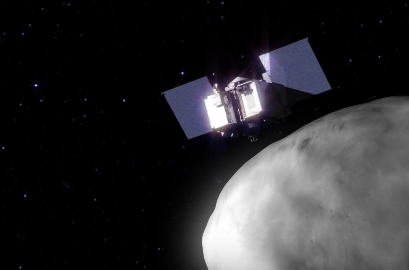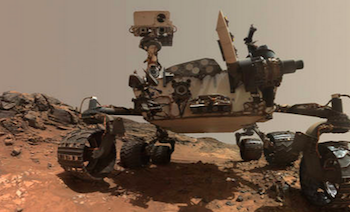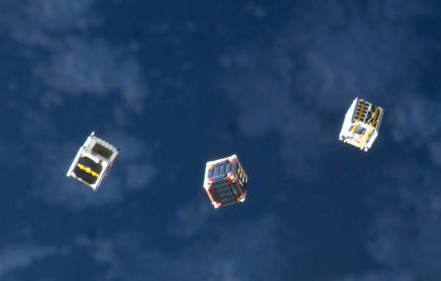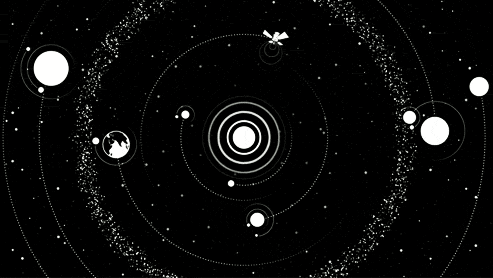If Our Universe Is So Old And Vast, Then Where Are All The Aliens?









If Our Universe Is So Old and Vast, Then Where Are All the Aliens?
Read more at: http://futurism.com/images/ http://futurism.com/images/if-our-universe-is-so-old-and-vast-then-where-are-all-the-aliens/
More Posts from Curiositytherover and Others
Australian researchers have investigated signs of geological structures hidden behind the Great Barrier Reef in Queensland, and have found a much deeper reef spanning more than 6,000 square kilometres (2,316 square miles).
New seafloor maps of the area have revealed a vast, underwater field of doughnut-shaped mounds, each one measuring 200 to 300 metres (656 to 984 feet) across, and some as much as 30 metres deep.
Scientists have seen hints of this enormous reef for over 30 years, but until now, haven’t had the chance to investigate it properly.
Fortunately, Royal Australian Navy aircraft fitted with LiDAR remote sensing technology have been flying over the area, and have finally mapped the shape, size, and vast scale of the deep reef.
“We’ve now mapped over 6,000 square kilometres. That’s three times the previously estimated size, spanning from the Torres Strait to just north of Port Douglas,” says one of the researchers, Mardi McNeil from Queensland University of Technology.
“They clearly form a significant inter-reef habitat which covers an area greater than the adjacent coral reefs.”
Continue Reading.
Gravity, who needs it
Houston TX (SPX) Nov 20, 2015 What happens to your body in space? NASA’s Human Research Program has been unfolding answers for over a decade. Space is a dangerous, unfriendly place. Isolated from family and friends, exposed to radiation that could increase your lifetime risk for cancer, a diet high in freeze-dried food, required daily exercise to keep your muscles and bones from deteriorating, a carefully scripted high-tempo Full article
Solar System: 2016 Preview
What do we have planned for 2016? A return to the king of planets. A survey of mysterious Ceres. More postcards from Pluto. Anyone who follows solar system exploration in 2016 is in for quite a ride. Last year was one for the record books – and now here are 10 things to look forward to in the new year. See also: what we have planned agency wide for 2016.
Juno Arrives at Jupiter

July 4, 2016 is arrival day for the Juno mission, the first sent expressly to study the largest planet in the solar system since our Galileo mission in the 1990s. Humans have been studying Jupiter for hundreds of years, yet many basic questions about the gas world remain: How did it form? What is its internal structure? Exactly how does it generate its vast magnetic field? What can it tell us about the formation of other planets inside and outside our solar system? Beginning in July, we’ll be a little closer to the answers.
OSIRIS-REx Takes Flight

The OSIRIS-REx mission, short for Origins-Spectral Interpretation-Resource Identification-Security-Regolith Explorer, sets sail for an asteroid in September. The spacecraft will use a robotic arm to pluck samples from the asteroid Bennu to help better explain our solar system’s formation and even find clues to how life began.
Dawn Sees Ceres Up Close

After an odyssey of many years and millions of miles, in December the Dawn spacecraft entered its final, lowest mapping orbit around the dwarf planet Ceres. The intriguing world’s odd mountains, craters and salty deposits are ready for their close-ups. We can expect new images of the starkly beautiful surface for months.
Cassini Commences Its Grand Finale

In late 2016, the Cassini spacecraft will begin a daring set of orbits called the Grand Finale, which will be in some ways like a whole new mission. Beginning this year and extending into next, the spacecraft will repeatedly climb high above Saturn’s poles, flying just outside its narrow F ring 20 times. After a last targeted Titan flyby, the spacecraft will then dive between Saturn’s uppermost atmosphere and its innermost ring 22 times. As Cassini plunges past Saturn, the spacecraft will collect rich and valuable information far beyond the mission’s original plan.
New Horizons Sends More Postcards from Pluto

We have stared slack-jawed at the images and discoveries from last year’s Pluto flyby, but the fact is that most of the data that New Horizons collected remains on board the spacecraft. In 2016, we’ll see a steady release of new pictures — and very likely some expanded answers to longstanding questions.
Mars Missions March Forward

With five of our missions continuing their Martian quests, 2016 should be a good year for discoveries on the Red Planet.
Mars Odyssey
Mars Opportunity
Mars Reconnaissance Orbiter
Mars Curiosity
MAVEN
Mercury Transits the Sun

A transit is a very rare astronomical event in which a planet passes across the face of the sun. In May, Mercury will transit the sun, on of only thirteen Mercury transits each century on average.
LRO Keeps an Eagle Eye On the Moon

The Lunar Reconnaissance Orbiter (LRO) will extend its run in 2016, scanning the moon’s surface with its sharp-eyed instruments, investigating everything from lava tube skylights to changes at the Apollo landing sites.
Spacecraft Fly Under Many Flags

Our partner agencies around the world will be flying several new or continuing planetary missions to destinations across the solar system:
Akatsuki at Venus
ExoMars
Mars Express
Mars Orbiter Mission
Rosetta at Comet 67/P
Technology Demonstration Missions Push the Envelope

We’re always looking for new frontiers on distant worlds, as well as the technology that will take us there. This year, several missions are planned to take new ideas for a spin in space:
Deep Space Atomic Clock
NODES
LDSD
Make sure to follow us on Tumblr for your regular dose of space: http://nasa.tumblr.com
The Ins and Outs of NASA’s First Launch of SLS and Orion
NASA - Space Launch System (SLS) logo.
Nov. 27, 2015
NASA is hard at work building the Orion spacecraft, Space Launch System (SLS) rocket and the ground systems needed to send astronauts into deep space. The agency is developing the core capabilities needed to enable the journey to Mars.
Keep reading


Li-Fi is 100 times faster than Wi-Fi
What’s next in high-speed Internet? Beams of light, flickering faster than the eye can see. A recent test by New Delhi-based startup Velmenni used “Li-Fi” to transfer data at 1 gigabyte a second. The futuristic tech uses LED lightbulbs to send the high speed data — which could have a great impact on our world.

Scientists Grow Vocal Cord Tissue in a Lab for the First Time, and It Produces Sound
Scientists in the University of Wisconsin-Madison have successfully grown functional vocal cord tissue in a laboratory - yes, vocal cords that work. This remarkable new tissue engineering technique could, someday, be used to restore the voices of patients who have certain voice disorders that are (at the present junctures) untreatable.
Read more at: http://futurism.com/links/scientists-grow-vocal-cord-tissue-in-a-lab-for-the-first-time-and-it-produces-sound/

Saving lives on the road with virtual reality http://futurism.com/videos/saving-lives-on-the-road-with-virtual-reality/?utm_campaign=coschedule&utm_source=tumblr&utm_medium=futurismnews&utm_content=Saving%20lives%20on%20the%20road%20with%20virtual%20reality
Saving lives on the road with virtual reality
This virtual simulation is convincing drivers across the country of the dangers of distracted driving.

Injecting Gases Into The Stratosphere Could Reduce Hurricanes
In an attempt to combat climate change, a multinational team of scientists are studying how shading sulfate aerosols that are dispersed into the stratosphere could help cool the planet and reduce the number of hurricane occurrences. “We’re basically mimicking a volcano and saying we’re going to put 5 billion tons of sulfates a year into the atmosphere 20 kilometers high, and we’ll do that for 50 years,” says John Moore, head of China’s geoengineering research program
Read more at: Injecting Gases Into The Stratosphere Could Reduce Hurricanes

End texts with a period if you want to seem like a jerk
-
 andrewellisportfolio liked this · 1 year ago
andrewellisportfolio liked this · 1 year ago -
 snailswithwings liked this · 1 year ago
snailswithwings liked this · 1 year ago -
 dezignate reblogged this · 2 years ago
dezignate reblogged this · 2 years ago -
 ohfallingstar reblogged this · 2 years ago
ohfallingstar reblogged this · 2 years ago -
 powerhouseofthehell reblogged this · 3 years ago
powerhouseofthehell reblogged this · 3 years ago -
 powerhouseofthehell liked this · 3 years ago
powerhouseofthehell liked this · 3 years ago -
 videocore1984 liked this · 3 years ago
videocore1984 liked this · 3 years ago -
 dr-tarl liked this · 3 years ago
dr-tarl liked this · 3 years ago -
 random-jot reblogged this · 3 years ago
random-jot reblogged this · 3 years ago -
 random-jot liked this · 3 years ago
random-jot liked this · 3 years ago -
 gowatchauntydonna reblogged this · 3 years ago
gowatchauntydonna reblogged this · 3 years ago -
 gowatchauntydonna reblogged this · 3 years ago
gowatchauntydonna reblogged this · 3 years ago -
 liekoleur liked this · 4 years ago
liekoleur liked this · 4 years ago -
 hydrozoa-theimmortaljellyfish reblogged this · 5 years ago
hydrozoa-theimmortaljellyfish reblogged this · 5 years ago -
 outlastdesire liked this · 5 years ago
outlastdesire liked this · 5 years ago -
 calkestisponcho reblogged this · 5 years ago
calkestisponcho reblogged this · 5 years ago -
 calkestisponcho liked this · 5 years ago
calkestisponcho liked this · 5 years ago -
 tobyszieglers liked this · 5 years ago
tobyszieglers liked this · 5 years ago -
 cometfrog reblogged this · 5 years ago
cometfrog reblogged this · 5 years ago -
 cometfrog liked this · 5 years ago
cometfrog liked this · 5 years ago -
 darkgreeneyesonly reblogged this · 6 years ago
darkgreeneyesonly reblogged this · 6 years ago -
 sunsetbee liked this · 6 years ago
sunsetbee liked this · 6 years ago -
 actuallyhoratio reblogged this · 6 years ago
actuallyhoratio reblogged this · 6 years ago -
 zayngivemestrength reblogged this · 6 years ago
zayngivemestrength reblogged this · 6 years ago -
 blackwid0vv liked this · 6 years ago
blackwid0vv liked this · 6 years ago -
 jajachaik liked this · 6 years ago
jajachaik liked this · 6 years ago -
 utiradiel reblogged this · 6 years ago
utiradiel reblogged this · 6 years ago -
 lilith1020 reblogged this · 6 years ago
lilith1020 reblogged this · 6 years ago -
 lilith1020 liked this · 6 years ago
lilith1020 liked this · 6 years ago -
 psychedelicphonetics liked this · 6 years ago
psychedelicphonetics liked this · 6 years ago -
 garden-gnome-rampage liked this · 7 years ago
garden-gnome-rampage liked this · 7 years ago -
 zairrow reblogged this · 7 years ago
zairrow reblogged this · 7 years ago -
 kaldannan reblogged this · 7 years ago
kaldannan reblogged this · 7 years ago -
 thereallonelyagain reblogged this · 7 years ago
thereallonelyagain reblogged this · 7 years ago -
 thereallonelyagain liked this · 7 years ago
thereallonelyagain liked this · 7 years ago -
 bakugyou liked this · 7 years ago
bakugyou liked this · 7 years ago
